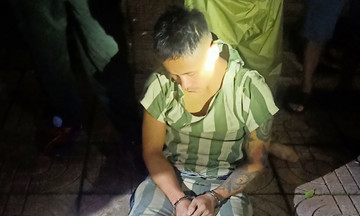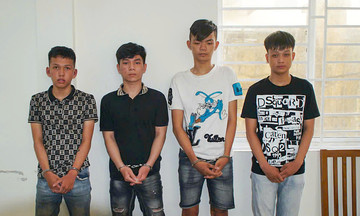On 13/7, Can Tho City Police reported rescuing two young women who were victims of an extortion scam involving individuals posing as police officers.
The first incident began on 10/7, when a 37-year-old woman from Rach Gia, An Giang province, accompanied her 18-year-old daughter to Can Tho. They rented a room on Nguyen Van Cu Street in An Binh ward, preparing for the daughter's university orientation. The following evening, the mother received alarming Zalo messages from her daughter. The messages claimed the daughter had been arrested and demanded a 100 million VND ransom to prevent her from being trafficked to Cambodia. Photos of the student were included. The terrified mother immediately reported the incident to the Can Tho City Police.
The Criminal Investigation Division quickly launched an investigation. The student eventually contacted her family, asking to be picked up on Ngo Si Lien Street in Tan An ward. Police intercepted the reunion, ensuring the student's safety and taking her to the station for questioning.
The student explained that she had received a call from someone claiming to be a Ministry of Public Security officer investigating a criminal named Le Van Son. The caller alleged that Son was using the student’s bank account for money laundering. When the student denied knowing Son, the caller insisted on further investigation. She was instructed to download Zoom and join a video call via a provided ID.
Believing the call was genuine, the student complied. The video call featured a man in a police uniform who presented a fabricated "arrest warrant" bearing the student's name. He threatened immediate arrest unless she followed his instructions. Fearing imprisonment, she followed the "officer's" orders, taking a taxi to a motel on Ngo Si Lien Street and cutting off contact with her family.
The scammers then forced the student to pretend to be kidnapped and call her family for money. This charade was designed to "prove" she had access to funds and wasn't involved in money laundering with Le Van Son.
From the time she rented the motel room until her rescue, the fake police officers pressured her to call her family for the money, threatening violence and trafficking to Cambodia. Guided by the police, the student's mother refused to transfer any money and cooperated with the investigation.
After hours of intimidation yielded no payment, the scammers abandoned their scheme.
A similar incident occurred on the afternoon of 11/7. A 52-year-old man from Cai Rang ward reported to the Criminal Investigation Division that his 21-year-old daughter had been kidnapped, with the perpetrators demanding a 50 million VND ransom.
Investigators reviewed security footage and collaborated with local police to search motels, boarding houses, and hotels. Late that night, they located the young woman at a hotel on Tran Binh Trong Street in Ninh Kieu ward.
At the police station, the young woman recounted a similar story. She had received a call from someone claiming to be a Ministry of Public Security officer, accusing her of involvement in drug trafficking and money laundering. Fearful of the impact on her family, she checked into the hotel on Tran Binh Trong Street as instructed, ceasing all communication with her family. Her father was subsequently contacted by the criminals and told to pay the ransom.
These "online kidnappings" have become increasingly frequent, often perpetrated by criminal networks operating from abroad. Their targets are typically students or young people with limited life experience. While the Ministry of Public Security and local police have issued warnings and guidance, many still fall prey to these scams.
The public is advised to never provide personal information, bank details, or OTP codes to unknown callers claiming to be police officers. Complying with demands for isolation, hotel stays, or installing unfamiliar apps is the first step towards becoming a victim of an "online kidnapping." In any suspicious situation, remain calm, end the call, and contact the emergency hotline 113 or the nearest police station.
Parents and schools are urged to educate students, a particularly vulnerable group, about these tactics and to emphasize the importance of not following instructions received from unknown callers.
An Binh












